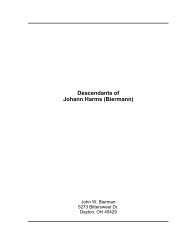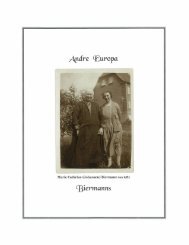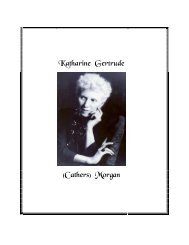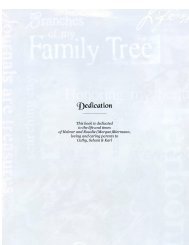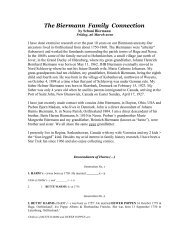A Collection of Dad's Essay's & Writings - Welcome
A Collection of Dad's Essay's & Writings - Welcome
A Collection of Dad's Essay's & Writings - Welcome
Create successful ePaper yourself
Turn your PDF publications into a flip-book with our unique Google optimized e-Paper software.
Peerce and Nelson Eddy featured a truly remarkable song called simply “A Dream” by Bartlett which seems to have<br />
almost disappeared from public consciousness. This attractive ballad was written by John Carroll Bartlett, a native <strong>of</strong><br />
Harmony, Maine. He later toured with violinist Camilla Urso but his reputation rests solely on this exquisite little<br />
concert song.<br />
The late Paul Robeson kept one <strong>of</strong> those stunning compositions <strong>of</strong> Sir Charles H. H. Parry alive in concert and on<br />
disc when he rendered "Jerusalem”, one <strong>of</strong> Parry's most inspired creations. Robeson also <strong>of</strong>fered four ballads in the<br />
1935 film, “Sanders <strong>of</strong> the River”, based on a story by Edgar Wallace set in Africa which has been sadly neglected. The<br />
music is credited to a composer named Spoliansky.<br />
Some American and British opera stars have been successful with musical comedy, operetta and popular songs,<br />
but for the most part they have not matched the European opera stars like McCormack, Tauber, Wunderlich, Pinza<br />
and others when it comes to lighter fare. Richard Crooks, Jan Peerce and a few other Metropolitan stars were quite<br />
successful in rendering light ballads. One <strong>of</strong> the most successful though was Gladys Swarthout, whose mezzo soprano<br />
voice lent itself to fine renderings, particularly <strong>of</strong> Arthur Schwartz's, “Dancing in the Dark” and Vincent Youmans,<br />
"Through The Years."<br />
Prior to the First World War, two Yale students created “The Long, Long Trail” and one <strong>of</strong> them, Stoddard King,<br />
won a literary prize for the verses. The music was composed by Zo Elliot. When the composer went to Oxford in<br />
England it became very popular with students over there and eventually it was published in Britain and it was sung by<br />
British troops during the First World War. There are also reports that it was a favorite with the Kaiser's troops during<br />
the First World War<br />
The Second World War brought out a vast number <strong>of</strong> popular ballads. In Britain it was “The White Cliffs <strong>of</strong><br />
Dover” and in Germany it was “Lili Marlene”, which Allied soldiers first heard when serving in Africa. Composer<br />
Norberr Schultz, who also wrote operas and other serious works, contributed the music to this ballad. Interestingly<br />
enough, the words go back to 1915 during the First World War when it was written by Hans Leip, a German soldier<br />
with poetic bent. Apparently he had two girl friends, Lili and Marlene.<br />
But perhaps the one outstanding composition from the war years that is completely forgotten because it was<br />
strictly a wartime story is from the film, “Shipyard Sally”. Gracie Fields, the coloratura soprano, was unique in that<br />
she was not noted for her singing <strong>of</strong> the great coloratura roles such as the “Daughter <strong>of</strong> the Regiment” but pop songs.<br />
In "Shipyard Sally” she warbled in grand style a selection called "Wish Me Luck". Fields played the role <strong>of</strong> one <strong>of</strong> the<br />
many women who worked in the shipyards while the men were at war and her recording <strong>of</strong> the song was hit parade<br />
material. She also sang a number <strong>of</strong> novelty pieces but among pop tunes, “Wish Me Luck” was unique in that she<br />
displayed her high coloratura notes in real Lili Pons fashion. In her retirement years, Gracie Fields lived on the Isle <strong>of</strong><br />
Capri.<br />
From the days <strong>of</strong> Britain's Empire building comes poet Rudyard Kipling's, “Road to Mandalay”, set to music by<br />
Ohio-born Oley Speaks, who also gave the world the charming “Sylvia”.<br />
Radio programs were sometimes responsible for bringing songs to the public attention. One such number is<br />
Ernesto Lecuona's, “Siboney” which was featured by Jessica Dragonette in her popular radio show many decades ago.<br />
This lovely song was written in 1929.<br />
With St. Patrick's Day celebrations in many cities around the world, it is certain that Irish ballads are not among<br />
the neglected, but there are a few that could stand more exposure. The late Frank Patterson was responsible for<br />
keeping many <strong>of</strong> them alive, but for the ultimate is the truly inspired interpretation <strong>of</strong> “A Soldier's Dream” in an<br />
arrangement by Ludwig van Beethoven. Among the many vocal compositions <strong>of</strong> the German composer, is a large<br />
collection <strong>of</strong> Irish, Scottish and Welsh songs which he arranged for George Thomson <strong>of</strong> Edinburgh who <strong>of</strong>fered<br />
Beethoven a sizable sum. It has been said that the composer only did it for the money, but the marvelous<br />
arrangements show that the composer gave each piece careful attention. “A Soldier's Dream” was one <strong>of</strong> the<br />
collections which incidentally also included a lovely arrangement <strong>of</strong> “Auld Lang Syne”.



